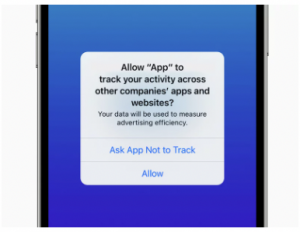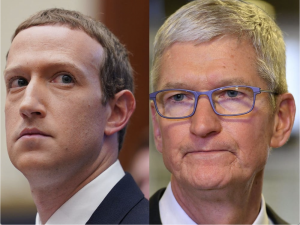Apple Takes a Stand For Privacy, Revolutionary? Or is there an underlying motive?
By Anonymous | July 9, 2021
On April 26th, 2021, Apple released their new software update iOS 14.5 with a slew of features, including their highly discussed privacy feature. Tim Cook speaks out on a virtual International Privacy Day Panel saying, “If a business is built on misleading users, on data exploitation, on choices that are no choices at all, then it does not deserve our praise. It deserves reform.” His speech takes a jab at Facebook’s stance on privacy, but it can be implicated on a larger level where Tim places Apple at the forefront for privacy advocacy. However, is Apple really making such a revolutionary change?
Before we can answer that question, what does Apple’s privacy feature specify? Apple’s website highlights App Tracking Transparency where it requires apps to obtain user consent prior to data tracking for third-party companies. It still allows the original company to track user data and allows parent companies to track user data from their subsidiaries. For example, Facebook can utilize data it gathers from Instagram. However, it does not allow for data to be shared to a data broker or other third-party if the user does not explicitly give consent to third-party tracking.

So what does this mean for the ordinary user? Actually, it means a lot. People, for the most part, have notably breezed through the indigestible terms and conditions of many applications and Apple has provided a concise, comprehensible pathway for human involvement in data collection. Human involvement, as one of the algorithmic transparency standards Nicholas Diakopoulos advocates for in his article Accountability in Algorithmic Decision Making, is important as it gives users insight to the data collection and usage process allowing them to make informed decisions. This new point of contestation in the data pipeline is absolutely revolutionary.
But what does that mean for companies that benefit from third-party tracking? Facebook criticizes Apple’s position on privacy as they claim that this new privacy feature stifles individual advertising and is detrimental to small businesses. There exists a constant tension between transparency and competitive advantage and companies like Facebook are concerned over their potential loss in profits. So when Facebook makes these claims and threatens an antitrust lawsuit over utilizing their market power to force third-party companies to abide by rules that Apple branded apps are not required to follow, it calls into question whether Apple is indeed taking a stand for user privacy or it is acting in its own self interest.

Whether there is an underlying or motivating self-interest for Apple to feature its new privacy design, it stands to reason that adding a new point of contestation in the data pipeline is a landmark proposition.
References
- https://www.apple.com/legal/privacy/en-ww/
- https://www.theverge.com/2021/4/27/22405474/apple-app-tracking-transparency-ios-14-5-privacy-update-facebook-data
- https://www.businessinsider.com/facebook-apple-antitrust-lawsuit-app-store-2021-1
- https://www.npr.org/2021/04/26/990943261/apple-rolls-out-major-new-privacy-protections-for-iphones-and-ipads
- https://cacm.acm.org/magazines/2016/2/197421-accountability-in-algorithmic-decision-making/fulltext
